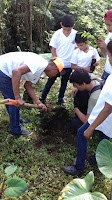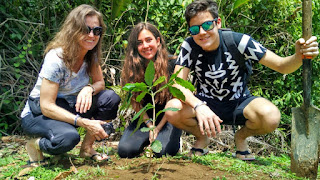 It's been more than a decade since the World Tourism Organization (WTO) defined sustainable tourism as managing all resources in such a way that economic and social needs are fulfilled while maintaining cultural integrity and biological diversity.
It's been more than a decade since the World Tourism Organization (WTO) defined sustainable tourism as managing all resources in such a way that economic and social needs are fulfilled while maintaining cultural integrity and biological diversity.Costa Rica has successfully marketed itself as a leader in going green. The country prides itself on its trailblazing efforts to set aside areas for conservation and establish a strong network of national parks, nature reserves and conservation areas.
In addition, Costa Rica has a stable democratic government with no army, a pleasant year-round climate, and is considered one of the happiest countries in the world.
It has one of the highest standards of living, the largest middle class, the best public health care system and public education through the university level, and the highest literacy rate in Latin America.
 Plus, Costa Rica plans to be a carbon neutral country by the time it marks its bicentennial celebration in 2021.Costa Rica is not far from this goal — it already gets 98 percent of its electricity from renewable resources (mainly hydropower, but also geothermal, wind, solar, and biomass). The only fossil fuel the country utilizes is diesel. Costa Rica’s President Luis Guillermo Solis proclaimed “...it’s the constitutional right of the people to enjoy a clean environment.”
Plus, Costa Rica plans to be a carbon neutral country by the time it marks its bicentennial celebration in 2021.Costa Rica is not far from this goal — it already gets 98 percent of its electricity from renewable resources (mainly hydropower, but also geothermal, wind, solar, and biomass). The only fossil fuel the country utilizes is diesel. Costa Rica’s President Luis Guillermo Solis proclaimed “...it’s the constitutional right of the people to enjoy a clean environment.”However, many visitors question if it’s just green washing or a real, authentic part of Costa Rican culture to be environmentally conscious.
 I’m happy to say, the younger generation in Costa Rica is truly embracing the concept of conservation and local schools and children regularly organize and participate in pro-environment activities.
I’m happy to say, the younger generation in Costa Rica is truly embracing the concept of conservation and local schools and children regularly organize and participate in pro-environment activities.Additionally, the private sector in Costa Rica has also recognized the economic benefits of streamlining business practices and many have jumped on the sustainability bandwagon. Desafio Adventure Company, for example, turned 25 years old this year and is not only considered the pioneer of adventure in the Arenal Volcano area, but also the pioneer of environmental education.
We have a long history of consistently organizing a variety of conservation activities such as river clean-ups, school recycling programs, and tree planting, as well as promoting socially and culturally responsible tours.
Every year we for the past 15 years Desafio has promoted its Desafio RETO RECICLAJE where we select 3 local schools from rural areas outside of La Fortuna to compete against one another for a month to see which school collects the most recyclable material.
 The winning school gets a school party with games, contests, food and other treats. The schools love it and the communities do, too, because the children are more conscience of abandoned waste materials and collect them and turn them in for the contest. The initiative helps clean up neighborhoods and helps in the fight against mosquito-borne illnesses such as dengue and zika.
The winning school gets a school party with games, contests, food and other treats. The schools love it and the communities do, too, because the children are more conscience of abandoned waste materials and collect them and turn them in for the contest. The initiative helps clean up neighborhoods and helps in the fight against mosquito-borne illnesses such as dengue and zika.We have also worked hard to get our workers, visitors, and local community involved and engaged because we recognize that the full involvement of local communities in tourism not only benefits them and the environment, but also improves the quality of our tourism projects.
That’s why we invite clients to participate in the Desafio Adopt a Tree program, an initiative that allows them to plant trees with local youth along strategic biological corridors and rainforest areas.
Desafio also has several tours that help clients get up close and personal with Costa Rican culture and ecological restoration programs, such as our Costa Rican Traditions Cooking Class and organic farm tours. By partaking in activities like these, clients experience the authentic “Pure Life” of Costa Rica firsthand.
Visit the Desafio Adventure Company webpage for more information or @DesafioCR on your favorite social media sites.



No comments:
Post a Comment